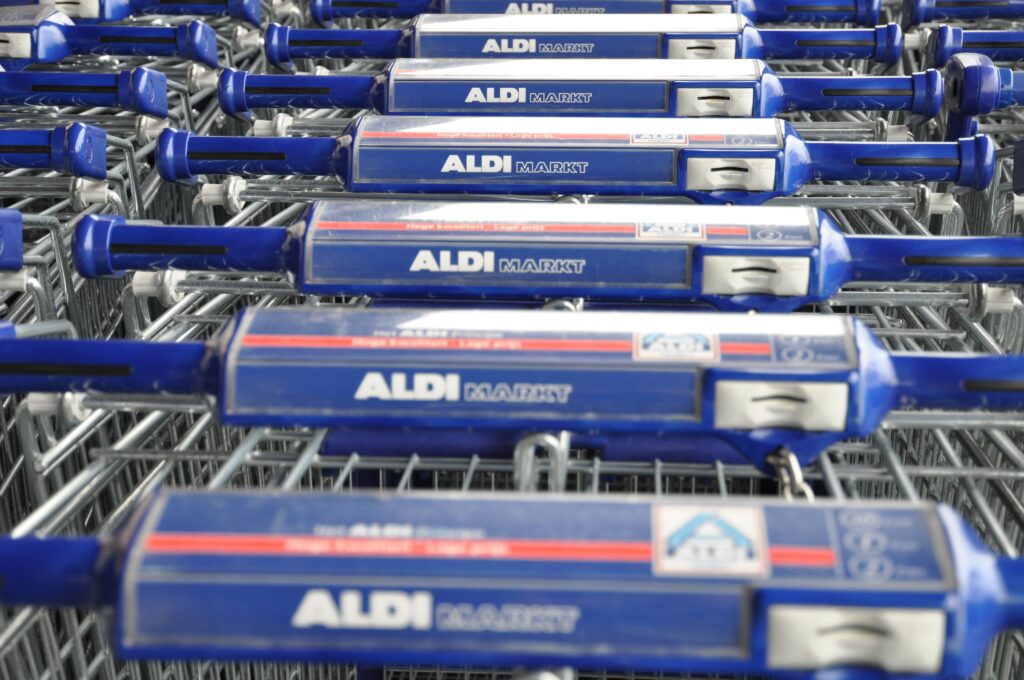Listen to Brenda read the story
Anyone living in Germany knows that to travel from the south to the north is to cross an important border. Forget the cultural divide between the southern states and former Prussia or between East and West Germany.
This one is between the two Aldis: Aldi Nord and Aldi Süd (north and south), with devoted adherents and family conspiracies rivaling those of Game of Thrones. Except instead of fortresses, battles, and death it’s a cheap grocery store chain.
This wildly successful company has an intriguing history. To say that Aldi has had a big impact on German shopping behavior would be putting it mildly. Aldi de facto created a whole new shopping genre: the “discounter,” also known in German by this English word.
The company started out like so many German companies, a phoenix rising from the ashes of WWII. Theo and Karl Albrecht took over their parents’ grocery store in 1945. This was an ideal time to open a business. There was so much destruction from the war that if you could manage to find something to sell, no matter what it was, someone would want to buy it. People were hungry, both literally for food and figuratively for all kinds of consumer goods that had been scarce for years.
The two brothers expanded the store into a chain to create Germany’s first discounter, a popular type of grocery store known for selling a limited but inexpensive selection of high-quality goods.
The same year Berlin was split in two by the construction of the wall, 1961, Aldi was also divided in two, Aldi Nord and Aldi Süd, north and south. Theo Albrecht took over Aldi Nord and Karl managed Aldi Süd. Nobody knows for sure why they split, but officially it was for business reasons.
Both Aldis enjoy a cultlike status. They have a dedicated shopping clientele, and despite their low prices, this is no Walmart. Porsches, Mercedes, and BMWs can be spotted in the parking lot. There is no shame in bargain-hunting at Aldi.
Aldi’s biggest competitor, Lidl, was founded in 1973 and also follows the discounter format by selling high-quality, low-cost popular food items. These two grocery store chains have so much market clout that after they recently began selling organic produce, they drove larger, pricier organic supermarkets out of business.
Lidl enjoys a following of its own, although not as cultlike as Aldi’s. They are like Irish Catholics versus American Methodists. Both groups go to church, but while the former are true believers, the other ones just go to hear the choir, sing hymns, and buy cupcakes at the bake sales. I speak from experience.
If Lidl and Aldi fans discover the other’s identity at a party or over lunch at work, they will immediately begin expounding on the virtues of their favored store chain, poo-pooing the other. An Aldi shopper would never go to Lidl, nor would a Lidl lover ever shop at Aldi.
Discounters have weekly seasonal specials that are carefully crafted to create a feeling of scarcity to attract customers.
I am just as vulnerable to these specials as the next person. When my daughters were learning to ski, I found myself standing in line at the local Aldi at 7:45 a.m., 15 minutes before opening time, to buy ski gloves for €12. After buying two pairs, on second thought I went back again the next day to stock up since my kids always seemed to be losing their gloves.
While sorting out old clothes after they left for college, I discovered an entire glove ecosystem in a drawer, complete with mismatched pairs, single gloves, and even a mutant outlier pair of white mittens that nobody had ever worn. They couldn’t even be used for skiing and had no business being there in the first place. I recalled buying them because, well, they were cheap. They might have come in handy.
I donated them to charity along with all the others.
Like the stores, the Aldi families themselves are also divided. But unlike the split between Aldi Nord and Aldi Süd, there is no mystery to the root of the family feud: money. Lots of it.
Strife erupted even though the company founders foresaw its likelihood and took great pains to avoid it. The two Albrecht brothers tried to stave off family feuding by transferring their fortune to the Markus, Lukas, and Jakobus Foundations.
But to no avail.
Berthold Albrecht, one of the two sons of Theo Albrecht, had five children. In his will, he stipulated that €250,000 be paid out to his heirs when they turned 32, but a loophole foresaw payments for “basic financial security.” Just one year after his death in 2012, his son Nicolay, his daughters, and his widow drew payments of €25 million from the Jakobus foundation.
The Aldi Nord half of the family was not amused. Theo Albrecht Jr. accused Berthold’s heirs of betraying the company’s legacy and the family’s values. The plot thickened further still when Nicolay was injured in an accident, whereupon his sisters and mother had him declared legally incompetent and admitted to a psychiatric hospital in 2019.
Or perhaps Nicolay’s sisters and mother were simply exacting revenge since he had previously accused them of breach of trust. He claimed that they illegally siphoned off millions of euros from the Jakobus Foundation.
Family companies usually try to keep the money in the family. On the surface, this seems like a great idea, but it becomes a problem if there’s too much money. It often can turn the family into one that nobody wants to be a part of anymore.
Good thing there’s a cheap store to buy microwave popcorn so we plebeians can enjoy the show.
Brenda Arnold
Photo by Onderwijsgek, CC BY-SA 3.0, via Wikimedia Commons
Also interesting:
Look here, U.S. election deniers – Berlin bungled it big time
The two dots that will make or break you
In awe of Colorado’s awfully good athletes
